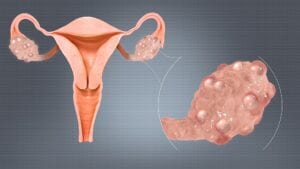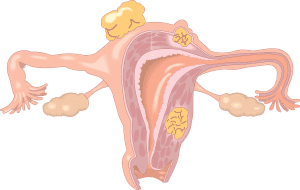Polycystic Ovary Syndrome
What is polycystic ovary syndrome?
Polycystic ovary syndrome (PCOS) is a hormonal disorder in which females may experience irregular menstrual periods or an excess of androgen. The ovaries will not release the normal amount of eggs, and they may develop follicles.
Females in their reproductive age may experience this syndrome.
What are the symptoms of polycystic ovary syndrome?
The onset of symptoms is usually around the beginning of puberty, when females experience their first period. People may experience irregular periods, which may last for a long time, come in irregular patterns, or be infrequent. Excess androgen is another symptom, which can result in facial hair, male-pattern baldness, and severe acne. Polycystic ovaries are the final symptom, meaning the organ is enlarged and has follicles. These symptoms may be more severe is one is obese.
It is important to seek treatment, as complications may arise, including:
- Infertility
- Sleep apnea
- Type 2 diabetes
- Metabolic syndrome
- Gestational diabetes
- Issues with pregnancy, such as premature birth or miscarriage
- Nonalcoholic steatohepatitis
- Abnormal uterine bleeding
- Depression and anxiety
- Eating disorders
- Endometrial cancer
What causes polycystic ovary syndrome?
Medical professionals are unaware of the exact cause of PCOS. They suspect that excess insulin, low-grade inflammation, heredity, and excess androgen all play a role.
How is polycystic ovary syndrome diagnosed?
Doctors will first conduct a physical exam and ask about medical history. No specific test exists to confirm a PCOS diagnosis, but doctors will recommend a pelvic exam, blood tests, and an ultrasound. If they suspect any complications, multiple tests will be conducted, such as screenings for mental illnesses, screenings for sleep apnea, and checks of blood pressure, cholesterol, glucose tolerance, and triglyceride levels.
What are the treatments for polycystic ovary syndrome?
Lifestyle changes, such as losing weight, limiting carbohydrates, and exercising, are a good way to manage the symptoms of PCOS. Doctors may also recommend medications, such as combination birth control pills, progestin therapy, clomiphene, letrozole, metformin, gonadotropins, spironolactone, eflornithine, and electrolysis.
Where can I find out more about polycystic ovary syndrome?
Polycystic Ovary Syndrome Articles

ICYMI: Having PCOS Could Raise Your Pancreatic Cancer Risk

World Orphan Drug Congress: Rare Disease Trials and Patient Registries


New Study Suggests 2 Gene-Based Subtypes of Polycystic Ovarian Syndrome


Chin Hairs in Women Could be Indicators of Cushing Syndrome or Congenital Adrenal Hyperplasia







